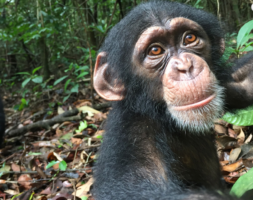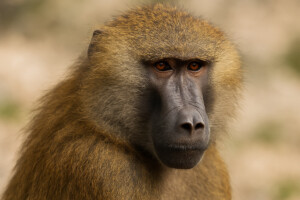THE PRIMATES MEGH AND DEBBY LILI WAIT FOR THE HABEAS CORPUS DECISION
THE PRIMATES MEGH AND DEBY ARE TREATENED AS DAUGHTERS BY THE FAMILY THAT IS ASKING IN THE JUSTICE FOR A HABEAS CORPUS IN ORDER TO AVOID THAT THEY ARE RELEASED IN THE WILD
Photo: Debby, 3, enjoys her skate board in the 300 m2 game room
Pet Chimpanzees
by Flávia Gianini e Flora Rangel
photos Maria do Carmo
The sisters Megh, 3, and Debby, 4, fight continuously for their parents\’ caress. Especially when the sister Joyce, 27, is around. They jump, yell and throw things to others. But in fact, this is not necessary. Both of them are object of total attention of the family, since they were adopted in the end of 2004. The competition between sisters would be normal if the little couple were not of two chimpanzees.
In a farm located in Ibiúna (70km from São Paulo), they live as people. And under this condition of "almost human", they turned to be the main characters of a lawsuit that is running at "Superior Tribunal de Justiça" (STJ, in Portuguese, a Federal Justice Tribunal), that is going to judge an habeas corpus for the benefit of the "girls", as the family call them.
According to OAB-SP\’s (Council of Attorneys) president, Luiz Flávio Borges D\’Urso, 48, non-human animals do not have individual rights, only the human beings, that he calls people. "It does not seem to me that the habeas corpus is the appropriate law procedure in this discussion. It is used with the intention of putting an end in a duress imposed to a human being. In other words, it is applied to someone, not to an animal."
Indifferent to the law controversy generated by the lawsuit ω since the Judge Alda Bastos, from the Federal Regional Tribunal, ordered that the chimpanzees should be released in their natural habitat -, Megh and Debby have fun in a 600m2 playground.
The place, that looks more with a recreational resort, was built to host them by the businessman Rubens Forte, who fell in love with the chimpanzees when they became homeless after the interdiction of "Paraíso Perdido", a private zoo at the city of Fortaleza where they were born.
Megh and Debby have 20 toys at an open area, among them slides, swings, little houses and a ball swimming pool. The fun continues in a 300m2 room of intelligent games used to stimulate them. Apart from skate boards and hammocks, a children laptop amuses the girls, who do not like dolls. Ball is the favorite toy of the super active Debby, who, differently from her sister, prefers the physical to the motor activities. "Megh is able to spend hours putting little stones inside a bottle", tells Rubens.
They sleep an average of 11 hours per day, in separate beds, with blankets and pillows. The bedroom is separated from the TV room, so that the noise does not disturb the sleep of the children. The day starts early for the babysitters Nena Machado, 28, and Camila Leite, 16, who wake up at 5 in the morning, 30 minutes before the primates, to prepare the
Chocolate formulas or the nourishing supplements to babies.
Nena and Camila dedicate all the day to the chimpanzees. They are the ones who prepare the five diary meals of the chimpanzees. These meals have the same menus of the one\’s of a human being, but are prepared in an exclusive kitchen. "They do not like to eat the same things one day after the other. If we repeat the meal, they complain and don\’t eat", says Nena.
The chimpanzees\’ routine is closely accompanied by "mother" Cláudia, who moved from São Paulo, where the human part of the family lives, to Ibiúna, to take care of the "youngsters". The long list of treats is rewarded. The primates hug, kiss and even groom the hair of the "parents", the "sister" and of the babysitters. "The girls do not have a fixed routine. They choose when and what they are going to do", guarantees Rubens, who keeps the chimpanzees in a big green area with a river at the back. It\’s about 1000 m2 of built area and five different environments connected and elaborated specially for them.
This routine, that is very human, turns the legal situation of Megh and Debby very complex. To release them in the wild, as defined by the Judge, would be a death sentence. "These animals have no condition of being introduced in the wild. They would die. They live in a human environment and were born in captivity", explains Antônio Ganme, coordinator of the Fauna Fiscalization Division of Ibama.
The stalemate is bigger because the primates are not native of Brazilian fauna. Biologist Luiz Fernando Padulla, who signed a technical document about the case to be presented to Justice, explains that release them in the nature is not viable. "This would put their life in danger and would cause an ecological imbalance, because they are native from African forests and have specific pathologies and different food needs."
The habeas corpus was an extreme way-out procedure taken by the businessman, who will put all possible effort to keep the animals nearby. For one year and a half, the chimpanzees live in a sanctuary, a place to keep exotic animals authorized by Ibama.
Living in São Paulo since 2005, they have already changed their address three times. In Ubatuba, they lived in a luxury area with the sea view. But, as they were close to a conservation area, Ibama has denied giving the authorization for a sanctuary, because their presence could cause ecological imbalance. TRF\’s decision came out when the couple was already at "Caminhos da Evolução" sanctuary, which did not have Ibama\’s authorization at the time.
"Ibiúna\’s sanctuary today is affiliated to GAP and is already regular to receive animals according to Ibama. This judicial decision has no sense at all", affirms Petro Ynterian, president of GAP – Great Ape Project International. "We are provoking the Brazilian Justice in order for them to confirm that the chimpanzees have the constitutional right to life."
The argument is that they have 99,4% of the human genetics, the same blood, are intelligent beings and live in communities. "They just do not know how to talk. But there are some humans that do not know either, aren\’t thereω", provokes Pedro.
Spoiled children
Rubens is up to go even to the International Justice Court at Hague, to keep the chimpanzees. He does not seem to be tired after three years of judicial battle. The first one was to transport them from Fortaleza to São Paulo. Ibama did not liberate the authorization, affirming that there were problems with the documentation.
Not accepting Ibama\’s denial, Rubens decided to continue with his plan, even without Ibama\’s authorization. "The situation was very serious. There was no food at the zoo", says the businessman. Firstly, he brought Debby, who used to be called Lily, as she was named on the zoo. Five months later, he went back to take Megh.
To help him in the trips, he hired a biologist. They divided diapers and formula\’s tasks. Rubens\’ dedication is 100%. He leaves São Paulo, where he manages a food industry, twice a week to visit the "girls" in Ibiúna. His wife even sleeps at their room when they are sick. "I know that this may seem madness to people who are not near us, but it\’s a kind of love that we can not explain", says the businessman.
Today, Megh and Debby would not be welcome by their cousins in Africa. While the Justice does not decide who is going to keep them, the primates\’ humanization gets to a point that they do not sleep on the floor and are not able to eat by themselves.
"They are not only children. They are two spoiled children", jokes Selma Mandruca, president of GAP Project Brazil.

 Español
Español
 Português
Português









